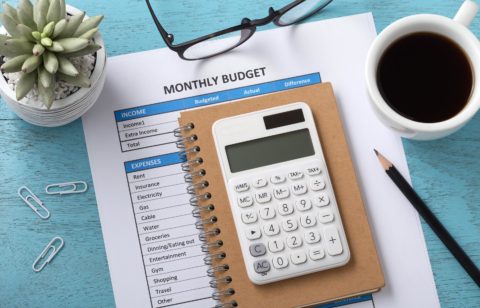Are you struggling to stick to your budget? This is a common problem among those who want to implement budgeting in their financial lives. If you really want to make a difference in your finances, it is very important that you learn how to budget. Implementing financial management is not possible without it.
Creating a budget is usually where a lot of people feel intimidated. They find it hard to set up a budget plan because it can be a tedious thing to do. There is some truth to this. The best budget plan usually begins with a detailed account of all your expenses. This is usually how you can create an accurate account of everything that your income is spent on. But after that, budgeting will only require a couple of revisions every now and then.
So what is the problem with budgeting?
Most of the time, you will find out that it is hard to stick to your budget. No matter how great your plan is or how accurate it is, if you lack the willpower to follow through, then the budgeting efforts will really fail.
This is more difficult as our cost of living rises faster than our income.
According to the data published on CNBC.com, the expenditure to income ratio rose from 71% in 1996 to 75% in 2014. This means we are spending a higher percentage of our income compared to the last two decades. This is one of the factors that add to the difficulty in sticking to a budget plan.
3 techniques to stay within your budget
Admittedly, it is harder to stick to a budget. However, that does not mean it is impossible to do it. There are a couple of ways that you can stay within the limits of your set budget. It is not too difficult but it might require you to change your mindset about your finances.
Here are three of the most simple yet effective ways that you can make sure your budget will be followed.
Use cash. Let us start by getting back to the habit of using cash for your purchases. According to an article published on PsychologyToday.com, paying for purchases usually involve a certain level of pain. However, the pain is different when you are paying with your credit card or cash. When you use the former, the pain is usually muted. However, paying for cash makes spending a lot more difficult because you feel the hard work that was put into earning the money you are holding. If you use credit cards, the payment transaction is actually hidden from you. This makes it less painful and thus prompts you to spend more. On the other hand, when you pay with actual money, you feel the payment that is taking place. So if you want to curb your spending so you can stick to your budget, this should be your preferred method of paying for purchases.
Keep your receipts. Another way to help you with budgeting is to monitor it by keeping all your receipts. Sometimes, we pay for all sorts of things but we really do not have the time to jot them all down. In the end, we forget about certain expenses that should have been a part of our budget in the first place. When the entries are incomplete, this makes your budget plan inaccurate and thus harder to follow. You want to keep your budget plan as accurate and updated as possible. This can only be helped if you can monitor your spending. If you cannot jot it all down, at least keep all the receipts in one area of your wallet or purse. That way, you can easily collate all your expenses and write them down when you have the time.
Use pen and paper. You have to remember that budgeting does not have to be hard. You can simplify your budget and stick to the old-school method of using a pen and paper. If you follow the second tip, you can take out a pen and paper, write your income on top of the page and then list all the expenses based on your receipts. This will allow you to see the actual expenses that your income is funding. You can decide how to change your spending habits for the next month or where you should cut back or spend more.
These are the three techniques that will help you stick to your budget. As you can see, these are not that complicated to follow. Even the receipts are not tedious. Writing with a pen and paper may be tedious but it is a great way for you to keep all your accounts in order. You can monitor your expenses this way and hopefully, whatever you find will help you identify the things that are making budgeting hard for you to follow.
Reasons why your budget plan is hard to follow
Of course, there are reasons why it is hard for you to stick to your budget. It may not be your attitude towards spending your money. Sometimes, it is based on how you created the budget plan in the first place.
In case you think that your budget is hard to follow, here are some of the reason why you may be having a hard time.
- It is unrealistic. Sometimes, we set high saving goals but in reality, our income and expenses cannot meet it. This is also true when you are trying to allocate the budget for your spending categories. Try to be realistic when you are setting how much should be spent on food and even your entertainment expenses. Do not limit yourself just so you can reach a high saving goal. Be honest about what you really need to survive and do not compromise comfort too much.
- It is not updated. Another reason why it is hard to stick to your budget is the fact that you have not updated it yet. According to the data from BLS.gov, the spending habits of people change depending on the state of the national economy. But beyond that, it can also change based on our personal experiences. For instance, if you have a new baby, your expenses will drastically change. You need to make sure your budget includes the expenses that your baby will need.
- It is not well-thought out. Sometimes, it is hard to come up with a budget because it can be tedious at the beginning. However, this is necessary for you to understand how much you are really spending. It will help you set a realistic budget that you can follow without difficulty. This is why you need to start your budget plan with the right idea of how much you really spend to support your preferred lifestyle.
- It is all in your head. Finally, a budget can be tough to follow if you only have it in your head. You need to write it down or put it in a spreadsheet on your computer. Unless you can see the figures, it would be very hard to monitor your budget and stick to it.
Here is a video that will help you start a simple budget and how you can stick with it.
Common questions about a budget
Question: Why is a budget important?
Answer: This is important because it will help keep your spending within your income. If you overspend beyond your income, that means you have used credit to finance some of your expenses.
Question: How does a budget work?
Answer: There are two important elements in your budget – the income and expenses. The income is usually just one entry – unless you have multiple sources of income. The expenses are more detailed. You need to list all of these because they reflect your cash flow. The income should always be greater than your expenses – that is how you can be sure that you will not be overcome with the use of credit.
Question: How can I create a budget?
Answer: You should start by identifying all your sources of income. If you have an irregular salary, use the lowest income that you usually get. You can also average it. Listing your expenses will come next. Try to be accurate in listing where your money goes every month. This list will help you determine if your money is going to your priority expenses or not. If it is not, then you should work on your spending habits to avoid compromising the funds that should be allocated to the important expenses.
Question: What is a budget plan?
Answer: This is a plan that will help you monitor your finances and plan how you will spend your money each month. Through this budget, you can identify what expenses should be sacrificed to make way for financial goals or other important spending requirements.
Question: What is an effective budget?
Answer: A budget can only be effective if you can stick to it and if it can bring you closer to your financial goals.







